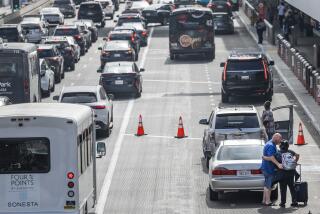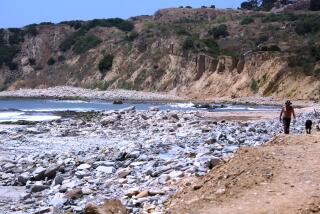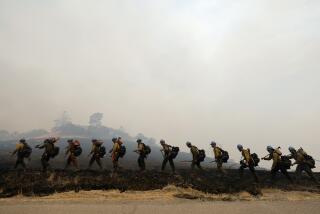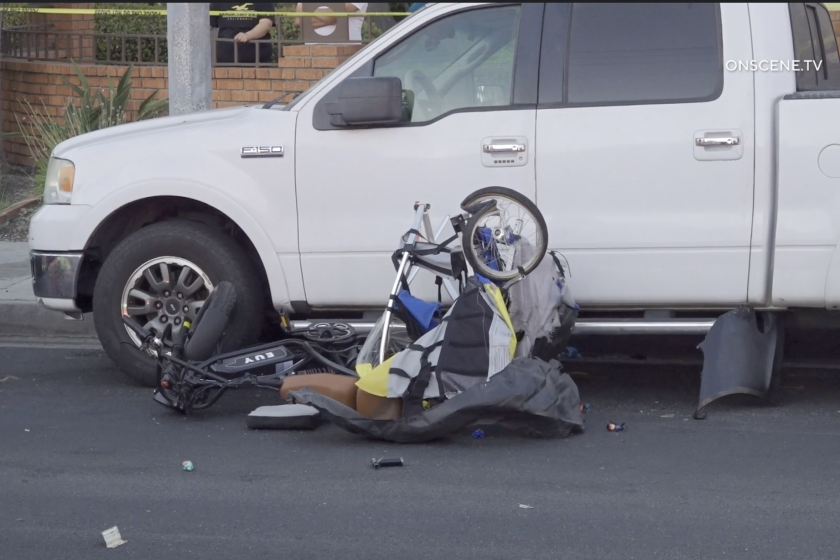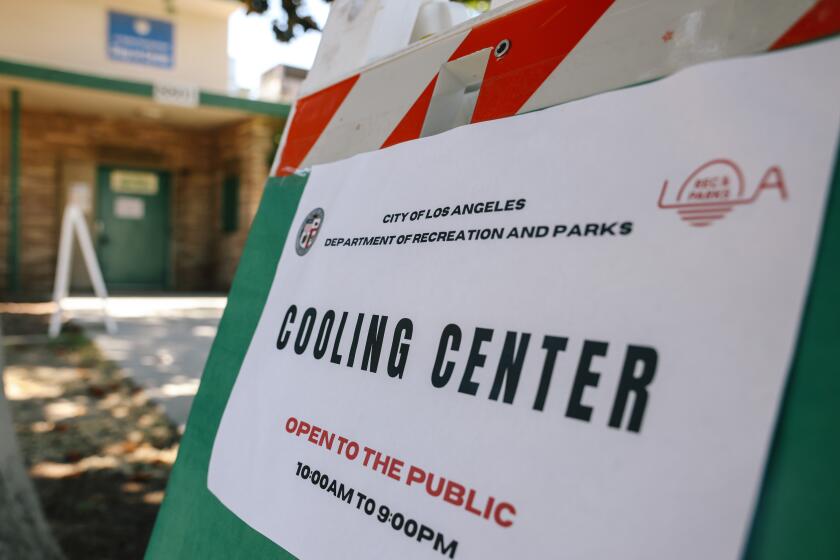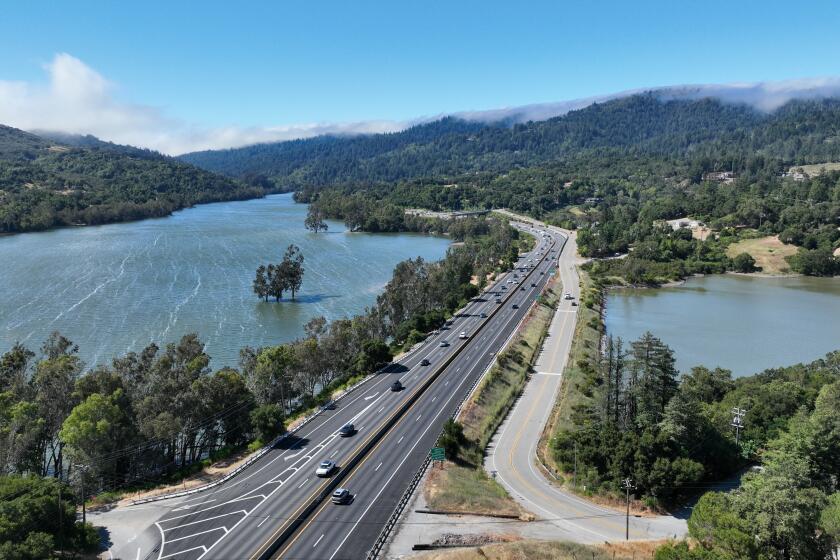William R. Johnson, First Bishop of Orange, Is Dead
The Most Rev. William R. Johnson, the first bishop of the Diocese of Orange and a passionate battler for social justice, died Monday night of a bacterial infection at St. Joseph Hospital in the City of Orange. He was 67, and had been suffering from kidney problems and related illnesses for the past year.
Johnson, who became bishop in 1976, had been debilitated by his illness for some time, diocesan authorities said, and in recent months had been in a wheelchair. In 1984, the Most Rev. John T. Steinbock was named auxiliary bishop of the diocese, and since that time he has been filling in for Johnson at various functions.
“He (Johnson) has enabled the church here to grow so much,” said Msgr. Michael P. Driscoll, chancellor of the diocese and former secretary to the bishop. “He has fought the battle, as St. Paul said, and he has merited the crown.”
“We mourn the passing of a spiritual giant, one of God’s choice leaders in Orange County,” said the Rev. Robert Schuller of the Crystal Cathedral in Garden Grove. “Our profound sympathy to all those to whom Bishop Johnson was shepherd and friend. And we know God will have the last word and it will be good.”
The bishop’s death came at 7:04 p.m.
Earlier, down the hall from the hospital’s coronary care unit, about a dozen people--Johnson’s family, friends and colleagues--filled a small classroom that had been turned into an impromptu waiting room. Throughout Monday they waited for word of Johnson’s condition. The phone in the room rang incessantly. Nurses brought orange juice, soft drinks and sandwiches, and the group tried to cheer each other up with frequent hugs and small talk.
One of those in the waiting room, Father Christopher Smith, associate vicar of religious education for the diocese, said Johnson was dedicated to making people feel welcome in the new diocese. Smith recalled how Johnson, a few days before he was installed as bishop, dropped by on a hot summer day at the house where Smith and some fellow seminarians were living. Caught by surprise while dressed in T-shirts and shorts, the seminarians were invited to share a cake that Johnson had just received as a gift, Smith said.
Father Mike Heher, who first met Johnson as a seminarian that day and is now studying at the Gregorian University in Rome, said Johnson was the perfect choice to be the first bishop of Orange.
Heher called Johnson “a real man of vision,” adding that leading the new diocese “was an incredible undertaking, and he entered into it with enthusiasm and a real sense of direction. He wanted the people of Orange to have a warm, welcoming experience with the church.”
Native of Nevada
A native of Tonopah, Nev., Johnson attended elementary school in Los Angeles and was graduated in 1938 from Los Angeles College, the former archdiocesan junior seminary. He was ordained in 1944 and later earned a master’s degree in social work at Catholic University of America in Washington, D.C.
Before creation of the Diocese of Orange, the 163rd in the United States, Johnson served for five years as auxiliary bishop of Los Angeles under Cardinal Timothy Manning. In that capacity he was active in social justice and charity matters. He was president of the National Conference of Catholic Charities in 1968, after heading the Catholic Welfare Board for 17 years.
As a young priest, Johnson served in an East Los Angeles parish. He was pastor of Holy Name of Jesus parish in Los Angeles, the first black Catholic parish in the city, for six years, a period that encompassed the Watts riots.
“Of all places,” Johnson said when named to head the new diocese, “I never expected to be assigned to Orange County.”
Fifth-Largest Diocese
In 1976, the 42-parish diocese had 333,860 members, making it the fifth-largest of the 10 Catholic dioceses in California. Today it is the second-largest diocese in the state, including nearly half a million Catholics in 52 parishes, about one-fourth of the county’s population. In addition, there may be as many as 250,000 “unregistered” Catholics in the county, according to Tom Fuentes, a spokesman for the diocese.
At the time of his appointment, Johnson, a registered Democrat, said he was in the “middle of the road” politically, adding, “I certainly relish the changes that have occurred in the church since the Second Vatican Council.”
Johnson said that before that historic conclave in Rome, called in 1962 by Pope John XXIII, the church was “a fairly rigid, centralized structure from the top down to the parish.”
Asked in 1976 what he could contribute to the new diocese, Johnson said, “I think the most important thing I can do is to try to inject a spirit of enthusiasm--but make sure it isn’t just enthusiasm, as such, but directed toward the Christian ideal, which is Christ himself.”
Johnson said that Catholic training should no longer consist exclusively of memorizing formulaic answers to doctrinal questions.
‘Have to Do Something’
“Many people think all they have to do is know something to be saved,” he said in 1976. “That’s not true. You have to do something and be someone.”
Each year, Johnson celebrated Christmas Mass with inmates at the Orange County Jail. In 1979, he established a Department of Hispanic Ministries, which included Spanish-language training courses for religion education teachers and a training seminar for youth ministers. Later, Vicar Tomas Clavel, retired archbishop of Panama, came to Orange County to work with the county’s Latino community.
Also in 1979, Johnson called on priests and parishioners to aid in the settlement of refugees from Southeast Asia, calling the situation “a challenge to our belief in human life and dignity.”
Johnson was active in opposition to the arms race. He voted with the majority at the U.S. Bishops’ Conference in 1983 to support a 155-page letter allying the bishops with the peace movement. “Being burned to a crisp by an atomic bomb is as much a threat to a Republican as a Democrat,” he said.
In March of this year, Johnson traveled to a nuclear test site in Nevada to be present for the arrest of Father Don Kribs, a longtime friend and anti-nuclear activist. Johnson, looking frail, had to be helped out of the car and into his wheelchair to observe Kribs’ arrest, which was planned as part of the observation of Kribs’ 25th year in the priesthood.
Bishop’s Opinion
Johnson said that he thought it was “terrible to put people like this in jail.”
Several years ago, Johnson acknowledged that on many social and political issues the bishops did not reflect the opinions of the Catholic laity.
“The bishops are more liberal than the priests, and the priests are more liberal than the people,” he said with a chuckle. He disagreed, he said, with those who argued that the issue of the nuclear arms buildup involved no moral issue and should be left to politicians rather than to priests.
Such a matter, he said, “involves millions and millions and millions of people and whether they are going to stay alive or be dead, whether the world is going to continue to exist or be a big cinder floating off in the wild blue yonder.”
Johnson’s appointment as bishop of Orange was seen as a major benchmark in the growth of the Roman Catholic community in Orange County.
Each parish, Johnson said at the time of his appointment, is a “faith community” that is “the whole heart and soul of the church.” In Orange County, he said, the parishes tended to be so large that they were in danger of becoming “more of a mass production operation.” One of his first acts was to create a new parish of 1,000 families in portions of Huntington Beach, Fountain Valley and Westminster.
Steinbock came to Orange County as auxiliary bishop, rather than as co-adjutor bishop, and auxiliary bishops do not have an automatic right of succession. Whether Steinbock will be named bishop of the diocese, and, if so, whether a new auxiliary bishop will be named, are both matters of speculation.
Diocesan officials said funeral arrangements are pending.
More to Read
Start your day right
Sign up for Essential California for news, features and recommendations from the L.A. Times and beyond in your inbox six days a week.
You may occasionally receive promotional content from the Los Angeles Times.
